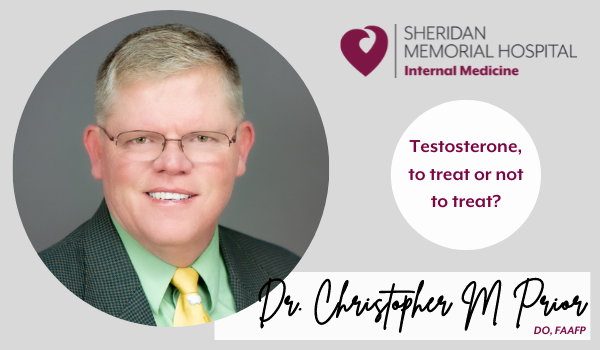By Dr. Christopher M. Prior, DO, FAAFP – Physician at Sheridan Memorial Hospital’s Internal Medicine Practice
June is Men’s Health Month, and according to studies, 60% of men don’t consult their physician regularly and 33% are less likely to visit the doctor than women. But one area of men’s health is seeing a surge in activity.
Use of testosterone hormone as well as natural testosterone level boosting supplements has skyrocketed in recent years with people looking for treatment of fatigue, poor cognition, difficulty losing weight or gaining too much weight, and erectile dysfunction. The most common cause of low testosterone is age related low testosterone. Most adult males lose 1-2% testosterone annually after their mid-thirties. Chronic diseases such as obesity, sleep apnea, drug and alcohol abuse, hemochromatosis (harmful levels of iron in the body), as well as exposure to radiation or chemotherapeutics are potential causes of low testosterone. Rarely do genetic disorders lead to hypogonadism (a failure of the gonads, or testes, in men).
Treating potential causes of hypogonadism before starting testosterone supplementation would be the most common recommendation. Many people, however, seek over the counter supplements first. Unfortunately, some over the counter supplements can worsen symptoms or have adverse side effects. For example, there has been an increased number of young men in their 20’s and 30’s diagnosed with secondary hypogonadism caused by taking testosterone boosting supplements or illegally using testosterone hormone. Inappropriate use of testosterone can worsen sleep apnea, cause polycythemia (increases red blood cell count), elevate prostate specific antigen, increase cholesterol, as well as increase risk for stroke and heart attack.
Many urban areas have seen an increased number of low testosterone retail clinics. Most of these are cash only, with no insurance coverage for medications, lab tests or the prescription supplementation frequently recommended. Expensive blood work, estrogen blocking medications, pituitary stimulating hormones as well as testosterone supplementation can be cost prohibitive for most. While some users claim to feel better, think better, sleep better, and lose weight, there is very little evidence to support these claims.
Recently, the two largest medical organizations in the United States, the American Academy of Family Physicians and American College of Physicians agreed that the only clear reason to treat low testosterone is erectile dysfunction. While testosterone has been used to help bone density, cognition, anemia, overall well-being, and infertility—there are no articles suggesting benefits in these areas with testosterone supplementation.
Routine screening of testosterone levels is not recommended for asymptomatic males. When a patient has symptoms that may be related to hypogonadism they may be screened for low testosterone in addition to the previously listed chronic causes of hypogonadism. If testosterone levels come back low, testosterone replacement therapy can be initiated, with appropriate monitoring regularly with blood tests and clinical symptoms. This is generally a mutually agreed upon decision by the patient and provider after a review of risks and benefits.
Talk to your primary care provider about your healthcare concerns. If you don’t have one, check out Sheridan Memorial Hospital’s Internal Medicine practice or call: 307.675.2650

